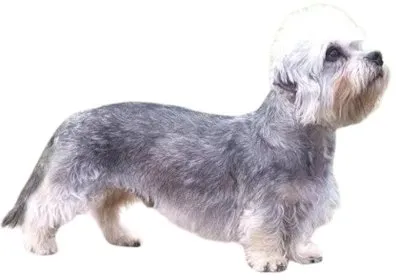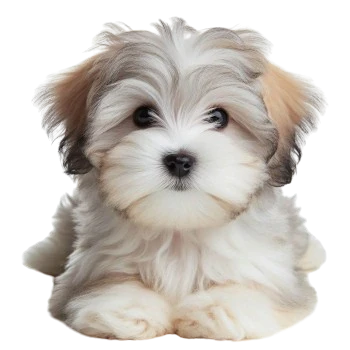
The Dandie Dinmont Terrier is a small to medium-sized dog breed originating from Scotland. Known for its distinctive appearance, with a broad head, a gentle expression, and a unique coat, this terrier is both a charming companion and a skilled hunter.
The Dandie Dinmont Terrier is a sturdy dog with a low and compact build. Males typically measure between 20 and 28 cm at the withers, while females measure between 20 and 25 cm. Their weight ranges from 8 to 11 kg. The body is long with a solid bone structure and short legs. The head is broad with a rounded skull and medium-sized eyes, often hazel in color. The ears are long, floppy, and covered with long hair. The muzzle is slightly tapered, and the nose is usually black.
Male Dandie Dinmont Terriers measure between 20 and 28 cm at the withers and weigh between 8 and 11 kg. Female Dandie Dinmont Terriers measure between 20 and 25 cm and also weigh between 8 and 11 kg. Their compact size and light weight make them suitable companions for apartment living as well as moderate outdoor activities.
The Dandie Dinmont Terrier’s coat is unique, consisting of two layers: a dense, soft undercoat and a harsher, wavy outer coat. The coat can be in colors of pepper and salt or mustard. Pepper color is a blend of gray shades, while mustard color is a lighter shade ranging from fawn to cream. Regular grooming is necessary to maintain the coat’s texture and appearance, particularly to prevent matting and keep the fur healthy.
The Dandie Dinmont Terrier is known for its intelligent, independent, and affectionate temperament. It is often described as a joyful and loyal companion, with a friendly disposition and a lively attitude. Although it can be somewhat stubborn, it is generally well-suited to families and gets along well with children and other pets. It requires regular mental and physical stimulation to stay happy and healthy. Its protective nature also makes it alert and vigilant.
The Dandie Dinmont Terrier is generally healthy, but like all breeds, it can be prone to certain health issues. Common conditions include skin problems, allergies, and joint disorders. It is important to provide a balanced diet, regular veterinary care, and moderate exercise to maintain its overall health. Regular grooming is also crucial to prevent skin issues and keep the coat in good condition.

The Dandie Dinmont Terrier Puppy is a small breed with a distinctive character and unique appearance, featuring a broad head and a fringe of hair falling over its forehead. This dog is known for being intelligent, courageous, and very affectionate towards its family. Although small in size, it has a determined temperament and is often an excellent companion dog. The Dandie Dinmont Terrier is also quite active, with plenty of energy for its size. It adapts well to indoor life but needs regular walks to channel its energy.
The price of a Dandie Dinmont Terrier Puppy typically ranges between 1,200 and 2,000 euros, depending on its pedigree and the breeder’s reputation. As with any breed, it is recommended to choose a reputable breeder to ensure the puppy’s health. Future owners should also consider the costs of maintaining its distinctive coat, as well as veterinary care and vaccinations.
The Dandie Dinmont Terrier is a unique and charming dog breed known for its independent character and loyalty. Here are some tips for effectively training your Dandie Dinmont Terrier:
Early Socialization: Introduce your dog to various environments, people, and animals from an early age. This will help it become a balanced and sociable adult.
Obedience Training: Use positive reinforcement methods to teach basic commands. Dandie Dinmont Terriers respond well to rewards and praise.
Regular Exercise: Although small, these dogs need exercise to stay healthy. Make sure to provide them with daily physical activities, such as walks or games.
Mental Stimulation: In addition to physical exercise, offer your Dandie Dinmont Terrier interactive toys and puzzle games to stimulate its mind and prevent boredom.
Patience and Firmness: Be patient but firm in your training approach. Dandie Dinmont Terriers can be stubborn, but they respond well to a consistent and determined attitude.